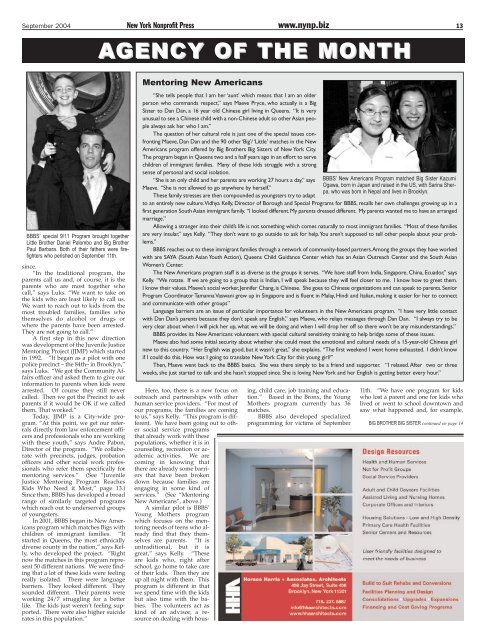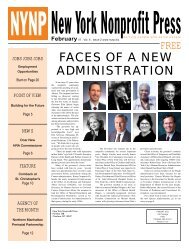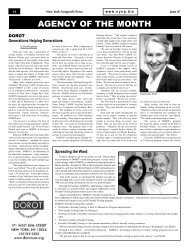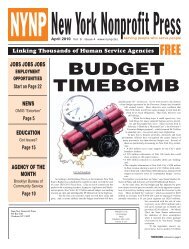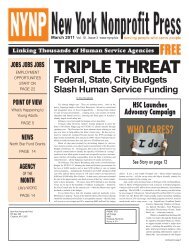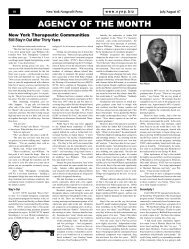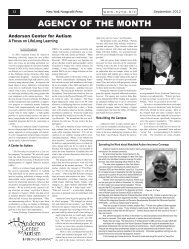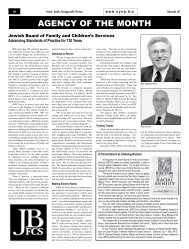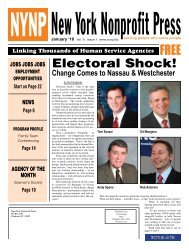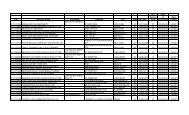September Edition 2004 - New York Nonprofit Press
September Edition 2004 - New York Nonprofit Press
September Edition 2004 - New York Nonprofit Press
Create successful ePaper yourself
Turn your PDF publications into a flip-book with our unique Google optimized e-Paper software.
<strong>September</strong> <strong>2004</strong> <strong>New</strong> <strong>York</strong> <strong>Nonprofit</strong> <strong>Press</strong> www.nynp.biz 13<br />
AGENCY OF THE MONTH<br />
Mentoring <strong>New</strong> Americans<br />
BBBS’ special 9/11 Program brought together<br />
Little Brother Daniel Palombo and Big Brother<br />
Paul Barbara. Both of their fathers were firefighters<br />
who perished on <strong>September</strong> 11th.<br />
since.<br />
“In the traditional program, the<br />
parents call us and, of course, it is the<br />
parents who are most together who<br />
call,” says Luks. “We want to take on<br />
the kids who are least likely to call us.<br />
We want to reach out to kids from the<br />
most troubled families, families who<br />
themselves do alcohol or drugs or<br />
where the parents have been arrested.<br />
They are not going to call.”<br />
A first step in this new direction<br />
was development of the Juvenile Justice<br />
Mentoring Project (JJMP) which started<br />
in 1992. “It began as a pilot with one<br />
police precinct – the 84th– in Brooklyn,”<br />
says Luks. “We got the Community Affairs<br />
officer and asked them to give our<br />
information to parents when kids were<br />
arrested. Of course they still never<br />
called. Then we got the Precinct to ask<br />
parents if it would be OK if we called<br />
them. That worked.”<br />
Today, JJMP is a City-wide program.<br />
“At this point, we get our referrals<br />
directly from law enforcement officers<br />
and professionals who are working<br />
with these youth,” says Andre Pabon,<br />
Director of the program. “We collaborate<br />
with precincts, judges, probation<br />
officers and other social work professionals<br />
who refer them specifically for<br />
mentoring services.” (See “Juvenile<br />
Justice Mentoring Program Reaches<br />
Kids Who Need it Most,” page 13.)<br />
Since then, BBBS has developed a broad<br />
range of similarly targeted programs<br />
which reach out to underserved groups<br />
of youngsters.<br />
In 2001, BBBS began its <strong>New</strong> Americans<br />
program which matches Bigs with<br />
children of immigrant families. “It<br />
started in Queens, the most ethnically<br />
diverse county in the nation,” says Kelly,<br />
who developed the project. “Right<br />
now the matches in this program represent<br />
50 different nations. We were finding<br />
that a lot of these kids were feeling<br />
really isolated. There were language<br />
barriers. They looked different. They<br />
sounded different. Their parents were<br />
working 24/7 struggling for a better<br />
life. The kids just weren’t feeling supported.<br />
There were also higher suicide<br />
rates in this population.”<br />
“She tells people that I am her ‘aunt’ which means that I am an older<br />
person who commands respect,” says Maeve Pryce, who actually is a Big<br />
Sister to Dan Dan, a 16 year old Chinese girl living in Queens. “It is very<br />
unusual to see a Chinese child with a non-Chinese adult so other Asian people<br />
always ask her who I am.”<br />
The question of her cultural role is just one of the special issues confronting<br />
Maeve, Dan Dan and the 90 other ‘Big’/ ‘Little’ matches in the <strong>New</strong><br />
Americans program offered by Big Brothers Big Sisters of <strong>New</strong> <strong>York</strong> City.<br />
The program began in Queens two and a half years ago in an effort to serve<br />
children of immigrant families. Many of these kids struggle with a strong<br />
sense of personal and social isolation.<br />
“She is an only child and her parents are working 27 hours a day,” says<br />
Maeve. “She is not allowed to go anywhere by herself.”<br />
These family stresses are then compounded as youngsters try to adapt<br />
to an entirely new culture.Vidhya Kelly, Director of Borough and Special Programs for BBBS, recalls her own challenges growing up in a<br />
first generation South Asian immigrant family. “I looked different.My parents dressed different. My parents wanted me to have an arranged<br />
marriage.”<br />
Allowing a stranger into their child’s life is not something which comes naturally to most immigrant families. “Most of these families<br />
are very insular,” says Kelly. “They don’t want to go outside to ask for help.You aren’t supposed to tell other people about your problems.”<br />
BBBS reaches out to these immigrant families through a network of community-based partners.Among the groups they have worked<br />
with are SAYA (South Asian Youth Action), Queens Child Guidance Center which has an Asian Outreach Center and the South Asian<br />
Women’s Center.<br />
The <strong>New</strong> Americans program staff is as diverse as the groups it serves. “We have staff from India, Singapore, China, Ecuador,” says<br />
Kelly. “We rotate. If we are going to a group that is Indian, I will speak because they will feel closer to me. I know how to greet them.<br />
I know their values. Maeve’s social worker, Jennifer Chang, is Chinese. She goes to Chinese organizations and can speak to parents. Senior<br />
Program Coordinator Tamanna Vaswani grew up in Singapore and is fluent in Malay, Hindi and Italian, making it easier for her to connect<br />
and communicate with other groups”<br />
Language barriers are an issue of particular importance for volunteers in the <strong>New</strong> Americans program. “I have very little contact<br />
with Dan Dan’s parents because they don’t speak any English,” says Maeve, who relays messages through Dan Dan. “I always try to be<br />
very clear about when I will pick her up, what we will be doing and when I will drop her off so there won’t be any misunderstandings.”<br />
BBBS provides its <strong>New</strong> Americans volunteers with special cultural sensitivity training to help bridge some of these issues.<br />
Maeve also had some initial security about whether she could meet the emotional and cultural needs of a 15-year-old Chinese girl<br />
new to this country. “Her English was good, but it wasn’t great,” she explains. “The first weekend I went home exhausted. I didn’t know<br />
if I could do this. How was I going to translate <strong>New</strong> <strong>York</strong> City for this young girl?”<br />
Then, Maeve went back to the BBBS basics. She was there simply to be a friend and supporter. “I relaxed. After two or three<br />
weeks, she just started to talk and she hasn’t stopped since. She is loving <strong>New</strong> <strong>York</strong> and her English is getting better every hour.”<br />
Here, too, there is a new focus on<br />
outreach and partnerships with other<br />
human service providers. “For most of<br />
our programs, the families are coming<br />
to us,” says Kelly. “This program is different.<br />
We have been going out to other<br />
social service programs<br />
that already work with these<br />
populations, whether it is in<br />
counseling, recreation or academic<br />
activities. We are<br />
coming in knowing that<br />
there are already some barriers<br />
that have been broken<br />
down because families are<br />
engaging in some kind of<br />
services.” (See “Mentoring<br />
<strong>New</strong> Americans”, above.)<br />
A similar pilot is BBBS’<br />
Young Mothers program<br />
which focuses on the mentoring<br />
needs of teens who already<br />
find that they themselves<br />
are parents. “It is<br />
untraditional, but it is<br />
great,” says Kelly. “These<br />
are kids who, right after<br />
school, go home to take care<br />
of their kids. Then they are<br />
up all night with them. This<br />
program is different in that<br />
we spend time with the kids<br />
but also time with the babies.<br />
The volunteers act as<br />
kind of an advisor, a resource<br />
on dealing with housing,<br />
child care, job training and education.”<br />
Based in the Bronx, the Young<br />
Mothers program currently has 36<br />
matches.<br />
BBBS also developed specialized<br />
programming for victims of <strong>September</strong><br />
BBBS’ <strong>New</strong> Americans Program matched Big Sister Kazumi<br />
Ogawa, born in Japan and raised in the US, with Sarina Sherpa,<br />
who was born in Nepal and lives in Brooklyn.<br />
11th. “We have one program for kids<br />
who lost a parent and one for kids who<br />
lived or went to school downtown and<br />
saw what happened and, for example,<br />
BIG BROTHER BIG SISTER continued on page 14


